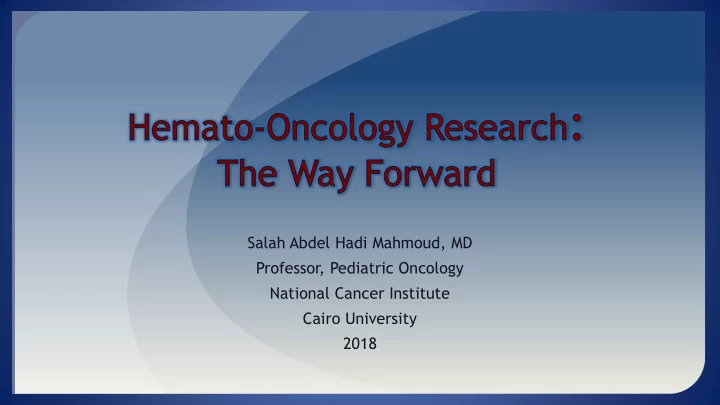

Salah Abdel Hadi Mahmoud, MD Professor, Pediatric Oncology National Cancer Institute Cairo University 2018
Leukemias and Lymphomas comprise around 2/3 of childhood malignancies. Hematologists/Oncologists strive to: a. Improve survival/quality of life of sick children. b. Research underlying biological etiologies. c. Compare studies from developed/developing world.
1967: Small group of pediatricians, surgeons, pathologists and others meet in Institut Gustave Roussy, France. Decision: form Pediatric Oncology Club. 1969 : Club transformed to International Society of Pediatric Oncology (SIOP) . Early On : Clinically Oriented Trials Multi Disciplinary Approach.
Over Time: Basic biological/etiologic aspects addressed PODC/Continental SIOP meetings Society Characteristics: o Truly international/influence and membership transcontinental. o More than 900 members worldwide . SIOP currently celebrates its Anniversary
Dr. Odile Schweisguth 1967 SIOP Founder Individuals create institutions
History: 1955 : Focus on childhood cancer research. 1990 s : FOUR cooperative groups : (i) CCG/POG: studying a diverse array of childhood cancers. (ii) IRSG/NWTS: cancer specific 2000 : the 4 groups voluntarily merged into COG .
World’s largest organization devoted exclusively to childhood and adolescent cancer research. Unites more than 9,000 experts in childhood cancer. 200 leading children’s hospitals, universities and cancer centers across North America, Australia, New Zealand and Europe. 90% of 14,000 children and adolescents diagnosed with cancer annually in the US cared for at COG member institutions.
COG research turned children’s cancer : FROM virtually incurable disease 50 years ago TO a combined 5 year survival rate of 80% today in the developed world. Goals: 1. Cure all children and adolescents with cancer. 2. Reduce short/long term complications of cancer treatment. 3. Determine causes/prevent childhood cancer.
COG provides unparalleled information/support to answer important clinical questions. COG has nearly 100 active clinical trials open at any given time. Trials include: Front line treatment for childhood cancers Underlying biology of childhood cancers New and emerging treatments Supportive care and survivorship
1998 : World Health Assembly passed resolution to eradicate polio. Goal : complete eradication/containment of wild vaccine related viruses. Huge Progress in eliminating vaccine preventable debilitating disease . 99.9% decrease in global polio incidence.
16 million : people walking who would otherwise have been paralyzed. 1.5 million : people’s lives could otherwise been lost. Task : a) to tackle polio in its last strong holds, b) reach every last child with polio vaccine, c) prevent any resurgence of disease world wide, d) ensure a polio free world for future generations . Are we entitled to contemplate a cancer free world for future generations?
Population: 1.2 billion (around 20% of world population) Multi Cultural/Multi Ethnic/Multi Lingual. Pediatric Oncology lags behind in service/research/educatio n. Characteristics: A) Poor infrastructure B) Lack of trained staff C) Socio cultural /limited financial resources D) Ignorance/cancer illiteracy contribute to advanced presentation and poor outcome of childhood cancers. (Arora & Banavali, 2009)
India has transformed to an economic power horse. Outcome of Pediatric Cancers has gradually improved from 20% to 60% in ALL. Similarities: a. There is real paucity of epidemiologic data on pediatric cancers in India (quite similar to our regional situation at large). b. Less than 15% of patients enrolled on clinical trials (90% in the West) (Arora & Banavali, 2009)
Progress: 1982 creation of National Cancer Registry Program. NGO gives free access to India Pediatric Oncology database and trains data managers. Multi center collaboration between US NCI and three Indian centers. Pediatric Oncology Education provides : (i) Pediatric Hem-Onc fellowships to post graduate students (ii) short time training to interested pediatricians, (iii) educate in primary care practitioners and pediatricians in early diagnosis and prompt referral of childhood cancers (Arora & Banavali, 2009)
TATA Memorial Hospital Commissioned by Sir Dorabji Tata Trust, an industrial consortium in Calcutta India 1941
TATA Memorial Hospital the newer version The 21 st century outlook
ALL PHYSICIANS, RESEARCHERS, epidemiologists, administrators, support groups and all individuals dedicated to the effective treatment of childhood cancer should strive to fulfill the dream of Danny Thomas the founder of St. Jude Children’s Research Hospital in Memphis Tennessee.
Danny Thomas 1962 Founder St. Jude Children’s Research Hospital in Memphis, Tennessee, USA Singer/actor/comedian/producer
1. We need to study what others have achieved. 2. We need to believe in our own abilities and strengths. 3. We need to replace INDIVIDUAL by INSTITUTION. 4. We need to replace SINGLE INSTITUTION by MULTI INSTITUTUION. 5. We need to replace LOCAL COLLABORATION by REGIONAL COLLABORATION.
Recommend
More recommend